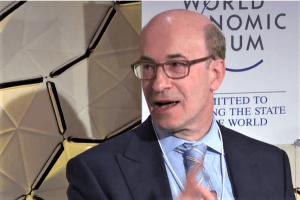“Crypto Is Too Small for Regulation,” Speakers at Davos
“I’ve spoken to the regulators and they very candidly say, ‘Well, there isn’t really that much value going on in the [cryptocurrency] transactions, a lot of it is speculation. It’s a very interesting innovation, let’s let it roll and see what happens.’ They’re not necessarily planning to let it continue to roll after it does well, but they’re planning to sort of see where the innovations go,” said Kenneth Rogoff, Professor of Economics at Harvard University, speaking at the second day of the World Economic Forum in Davos.

At the panel, titled “Building a Sustainable Crypto-Architecture,” Rogoff spoke about the lack of regulation in the cryptocurrency space. In his opinion, part of that is the fact that the transactions are simply not big enough yet: “Governments can’t tolerate large transactions […] But right now, regulation has not come yet. The US has tiptoed into it, everyone else is just starting to talk about it.” He adds, “This issue about evading capital controls – if it’s really small, the governments aren’t going to do much about it, but if it gets too expensive, [the governments] aren’t going to like it and they can find ways to stop you from spending [cryptocurrencies].”
Last spring, Rogoff said that “Bitcoin will be worth a tiny fraction of what it is now if we’re headed out 10 years from now … I would see USD 100 as being a lot more likely than USD 100,000 ten years from now.” He argued that in the aftermath of the potentially upcoming wave of crypto regulations plus tax authorities’ newly found interest in going after wealthy bitcoin holders, the value of the currency will likely diminish to be worth a small fraction of where it was trading back then.
Meanwhile, Jeremy Allaire, CEO and co-founder of the digital currency company Circle, said today that the reputation cryptocurrencies get for being the go-to option for criminals is misplaced.
“The biggest financial crime we have is with US Dollars – it’s a two trillion market of crime. [Out of all] the Central Bank-printed hundred dollar bills, half of them are sent overseas. I wonder who’s demanding those,” he said, adding, “Crypto is still too small, and the big guns are focused on the money that the [Federal Reserve System] is giving out to countries around the world, and that’s where the problem is.”
But there does not have to be a struggle between crypto and fiat – they are not mutually exclusive, believes Elizabeth Rossiello, founder and CEO of digital payments platform BitPesa.
“I’m for the promotion of African currencies, I’m for the promotion of African governments regaining the ability to control their own monetary systems, but there has to be a way to live in harmony, where we don’t say it’s all completely decentralized or we’re living under total control. There has to be innovation on that, and that’s where we’re struggling,” she said.
However, Rogoff is still afraid that complete decentralization could mean doom: “If someone wants to spend billions of dollars to bring down the international financial system, there are ways to do that [using crypto], and then who do you call? We’ve decentralized [everything].”
But Allaire does not believe that there is such a high risk of that happening.
“We live in a world where any major state actor could wreak havoc on the global financial system by attacking known systems. That’s not unique to cryptocurrency, that’s very well documented and understood […] but the issue is that it’s mutual destruction. No one really wants to bring down the global economic system,” he explained.
However, governments around the world are increasingly edging toward regulating and taxing the cryptocurrency sector – with executives in Europe and South America poised to act.
As reported by Cryptonews.com, this year, governments will likely focus on two areas: taxation and regulation surrounding offerings/marketing to the public. Also, having seen that cryptocurrencies are becoming more safely policed, the general public may become more willing to use and adopt them.
_____
Watch the whole discussion at Davos below:




